Two Point Hospital tips, and how to beat Duckworth-upon-Bilge
How to keep your patients alive, and your hospital from collapsing.
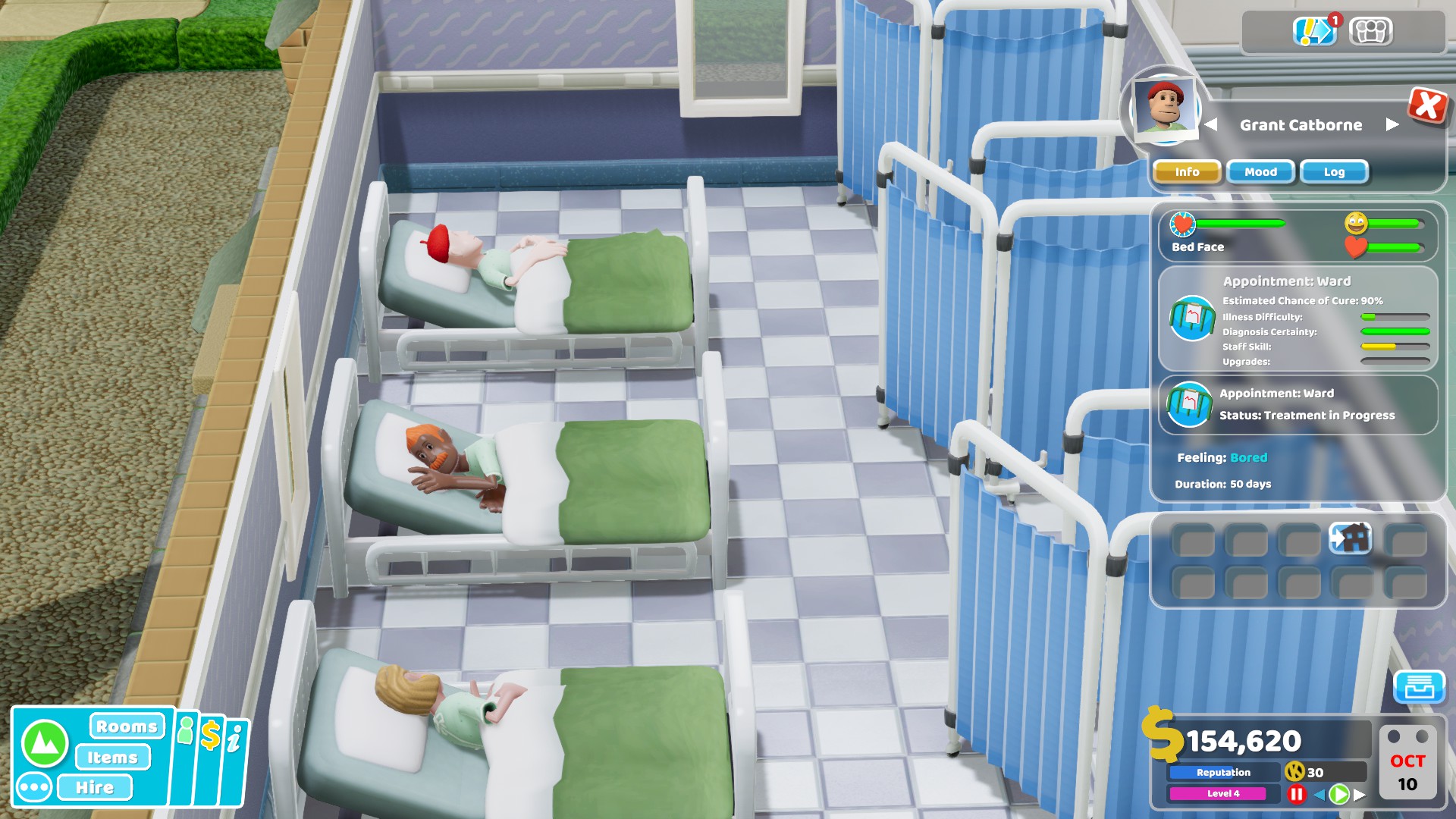
There was ectoplasm everywhere. The only janitor was engaged in a battle of wits with a clogged toilet, and he wasn’t winning. Nearby, a queue of sick people relieved themselves in the corridor. Outside the doctor’s office, patients had been waiting for over a year; they too were relieving themselves. I couldn’t afford more staff, and even with my skeleton crew I was hemorrhaging money. I wouldn’t have to worry for too long. My plummeting reputation would ensure that I’d stop getting patients eventually. Two Point Hospital’s Duckworth-upon-Bilge, one of the management game’s trickiest missions, is my white whale. Hopefully you can learn from my mistakes.
Achieving the coveted three-star rating in every one of Two Point Hospital's chaotic missions can be a meaty challenge, but if you just want to muck around, curing fictional illnesses and abusing clowns, you can muddle your way through the game without encountering too many road bumps. Netting your first star in each hospital is the easiest part, and that’s all you need to move onto the next mission. Duckworth-upon-Bilge, a struggling public hospital, is an exception, and if you're looking for specific or general advice, the lessons I learned there should help you improve your administrative chops.
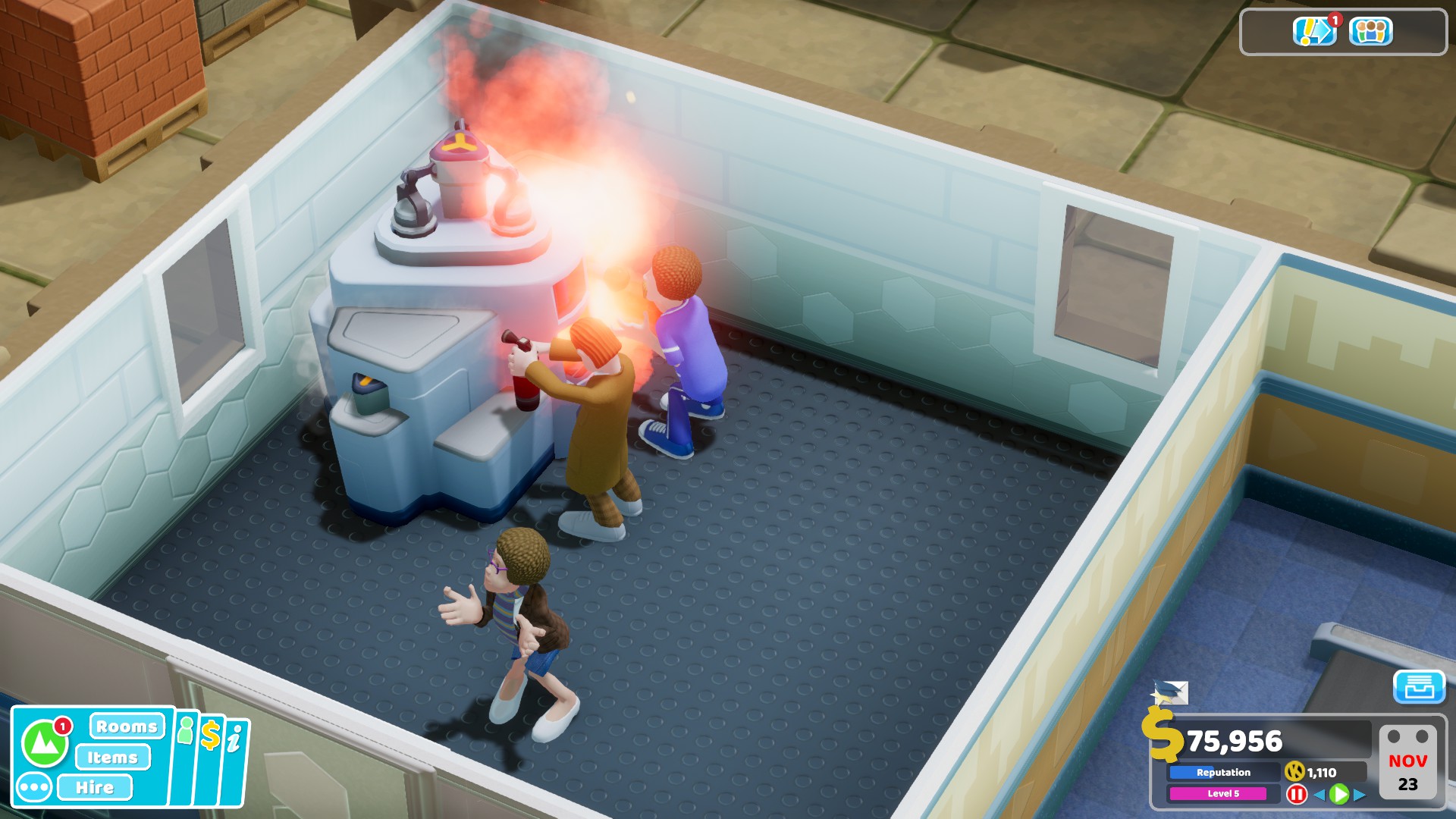
Making money
Cash flow is Two Point Hospital’s main safety net. Whatever disasters might befall you, a fat bank balance will usually help you make a startling comeback, and you’ll rarely be short of cash. Patients have to pay for their treatments even if you’ve done a terrible job, and the whole time they’re waiting to be seen by the doctors and nurses, they’re spending money in cafes and newsagents.
There are countless ways to inflate your bank balance. If you’ve got your eye on a gold-plated swimming pool, you might want to start filling your hospitals with vending machines full of salty snacks, placing them near your pricey drink vending machines. For an initial cost, marketing campaigns can also make a huge difference, turning your hospital into the place to be if you’ve got Mock Star or Night Fever or whatever weird ailment you want to focus on. As administrator your job is equal parts accumulating wealth and making sure your staff are curing people on death’s door. And throughout the missions, the game reinforces this, giving you more ways to get fat off your patients’ wallets. Duckworth-upon-Bilge sets fire to this safety net.
Balancing your budget
Patients visiting Duckworth-upon-Bilge don’t have to pay a penny for their treatments, and even the vending machines are free. Every little trick to bleed these people dry ceases to work the moment you take over. So while you start with a healthy bank account, that rapidly shrinks, and beyond taking out costly loans, there’s not much you can do from stopping that. Instead, you’ve got to hit public targets—essentially an extra set of challenges—netting you a cash reward. This is on top of doing the regular challenges and completing the mission goals, as well as trying to make sure your hospital doesn’t burn down.
It’s a functioning hospital right away. Sort of. The basics are all in place for diagnosing patients, and some staff are already working away. It looks quite nice, too. Instead of pokey little boxes, the rooms are spacious and stylish, with props and extra items adding a bit of personality to them and increasing the prestige of the hospital. So much for all that. When you’ve got money to burn, large, well-decorated rooms are a luxury you can afford, but in an underfunded public hospital where you’ll see more puke than cash? Start shrinking them down to a more reasonable size.
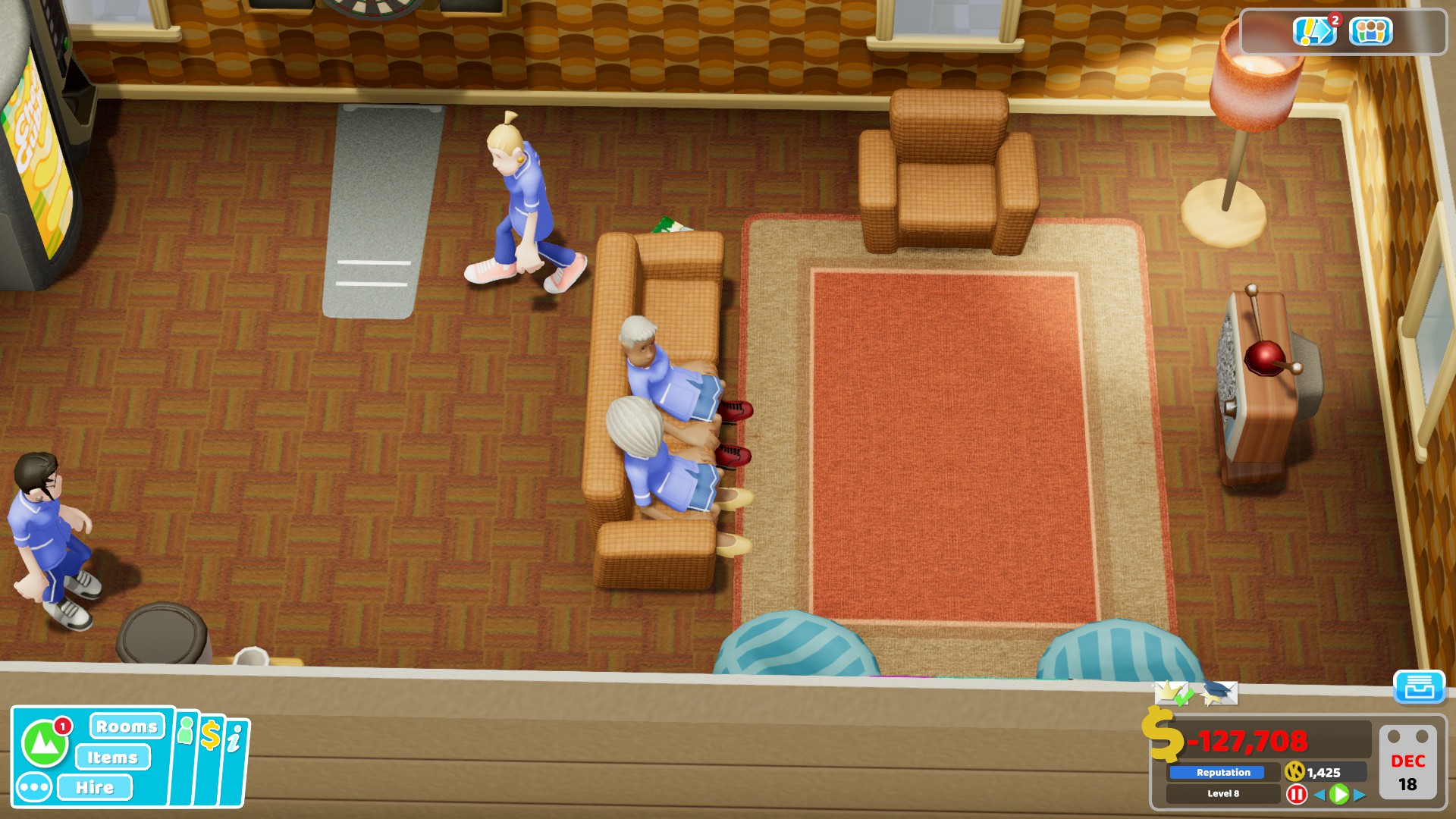
I got too attached too soon, building on the broken foundations instead of actually getting stuck in and fixing the problems. Then I expanded quickly, squeezing a few small rooms into the first building before dumping a big wad of cash on a whole new wing. I burned through my initial budget in a flash, and while the rewards from meeting public targets initially kept me above water, my costs were getting out of control.
Keep up to date with the most important stories and the best deals, as picked by the PC Gamer team.
None of this is to say that expansion shouldn’t be a priority. As a general rule, you should always be looking to add new rooms and staff, along with improving existing ones, to raise your hospital’s level. This is even more important in Duckworth-upon-Bilge, as the prerequisites for your first star include reaching level 8 and increasing your reputation, both of which mean more rooms and more treatment methods need to be plonked down.
So while you’re doing a reshuffle and a renovation, maximising the space of your first building, you should also be looking towards the future, to what you can do with all this extra space. You don’t want to be too merciless with the demolition, though. You might look at the staff room and wonder if your doctors, nurses and janitors really need all that leisure time, but another mission prerequisite is keeping morale high, so you can’t ignore your hospital’s attractiveness or ancillary rooms. It’s worth going through the staff list to see what their top complaints are. You don’t need to tackle all of them right away, so you should prioritise the ones that are genuinely unhappy. Spending your meager funds on props might sting, but it’s a lot cheaper than doling out huge raises to staff who are threatening to quit. The key is balance. You should build nice rooms that people want to work in, but they should be compact.
Build a training room first
The first room you should build is the training room. You start with two doctors, but both of them are crap. You’ll also only have room for one of them until you build another GP’s office, or any other room that requires a doctor. For reasons that I confess I’ve entirely forgotten, I put both of them into a general practice training programme at the same time, leaving my hospital entirely absent doctors. It should go without saying: don’t do that. On my second attempt I considered firing one of them, but it’s not worth the brief savings. You’ll need a psychiatrist for both diagnosis and treatment, a second GP and eventually a doctor to run the Resolution Lab. It deals with a new illness sweeping through the area, pixelating unsuspecting people. The jobs start piling up at an alarming rate.
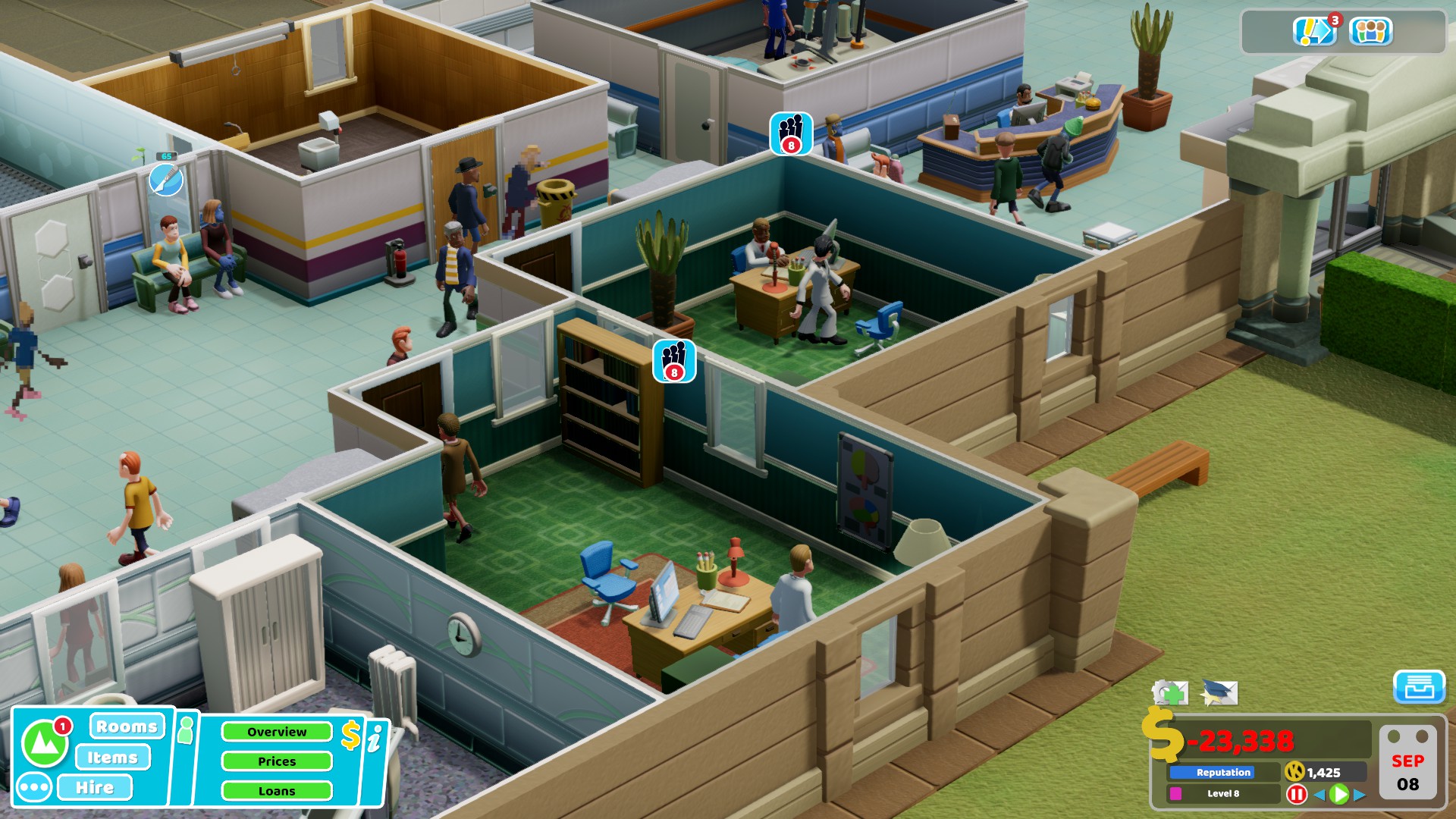
Find your bottlenecks
Turning away patients is a great way to tank your hospital’s reputation, so there’s a constant pressure to invest in more expensive facilities. You absolutely don’t want to go whole hog, however, slapping down new wards and treatment rooms full of pricey (and not remotely safe) doohickeys. If you’ve built your diagnosis rooms, you’ll be able to see what illnesses are more common, letting you build rooms only to deal with the big ticket ailments. Yes, it’s very sad that Dave Casserole’s head has shrunk, turned green and sunk into his neck, but if he’s the only one, he’ll have to wait.
If you’ve got treatment rooms that aren’t being used very often, you might be tempted to chuck them and get rid of the staff members running them. That could be the ruthless decision that keeps the hospital running for another year. When I noticed a doctor had only seen a handful of patients, curing only one of them, in 10 months, I was ready to give him the boot. So I did. I demolished the room, too. The next week I parted with 30 grand for a new room and another three to recruit a doctor to run the place. The dearth of patients, it turned out, was due to a blockage on the other side of the hospital.
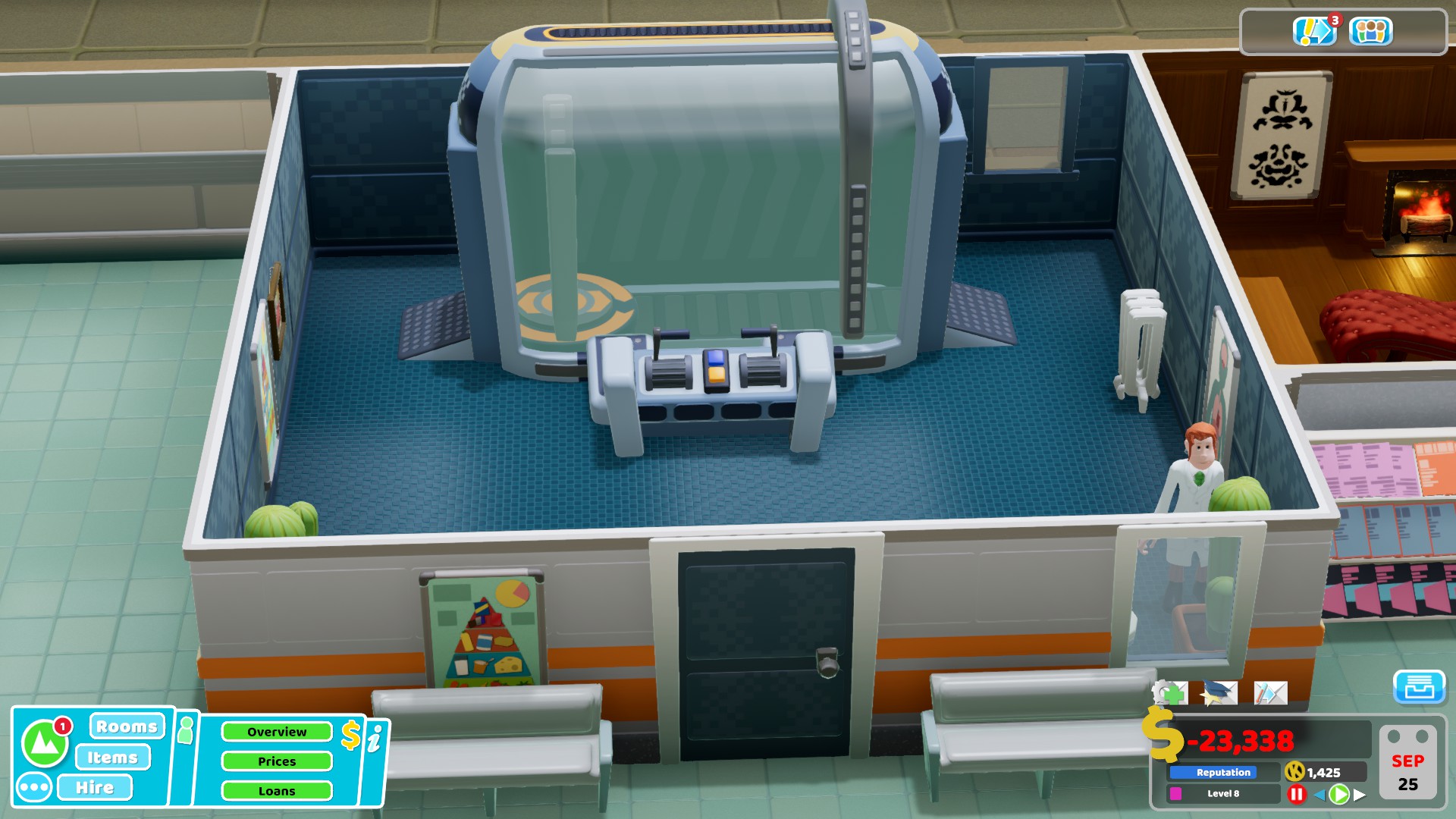
People were getting sent to the GP for a diagnosis, and that just became their life. Shuffling around hospital corridors, subsisting on snacks from vending machines, learning about the outside world from decade-old magazines—dozens of them were living like this for hundreds of days. So you might actually have a hospital full of people who need that treatment, but who instead find themselves waiting in purgatory, unable to even get a diagnosis. When there’s a blockage like this, GPs are almost always the source. It’s not their fault. Every patient visits the GP’s office, often multiple times, and queues are inevitable.
Even when you build your second GP’s office, the waiting area will keep filling up. You could buy a third, and if you’re in it for the long haul and aiming for a three-star rating, you might need to build a few more, but you really don’t want that drain early on. The list of rooms you’ll need to build and staff is long enough, and any additional doctors you hire will have their hands full. That’s why the training room is such a handy early investment. Get skills like motivation, which increases speed, and all the general practice and diagnosis skills. Once one of your staff has learned these skills from an expensive outside consultant, they can teach everyone else for free.
The point of all this training is to make sure patients get sent to treatment as swiftly as possible. If a doctor fails to make a successful diagnosis the first time, the patient will need to go to another diagnosis room, where a nurse or a psychiatrist will take over. The patient will then need to return to the GP’s office, where the doctor will then choose the next step, which could be yet another trip to a diagnosis room, or maybe, finally, treatment. A well-trained doctor can sidestep all of that rigmarole, allowing the patient to go straight to treatment, then home.
Micromanage where needed
Big queues mean there’s a greater chance of patients keeling over and dying. This is why I had that aforementioned ectoplasm problem. Fixing the source by training better staff takes time, but there are also ways to alleviate some of the symptoms. If someone’s health is dangerously low, you can bump them to the top of the queue using their chart. Duckworth-upon-Bilge is also a bit on the chilly side, so some radiators in the waiting areas are a necessity. Most missions have a temperature quirk, so you should get used to bringing up the temperature overlay and placing radiators or air conditioning units where people linger.
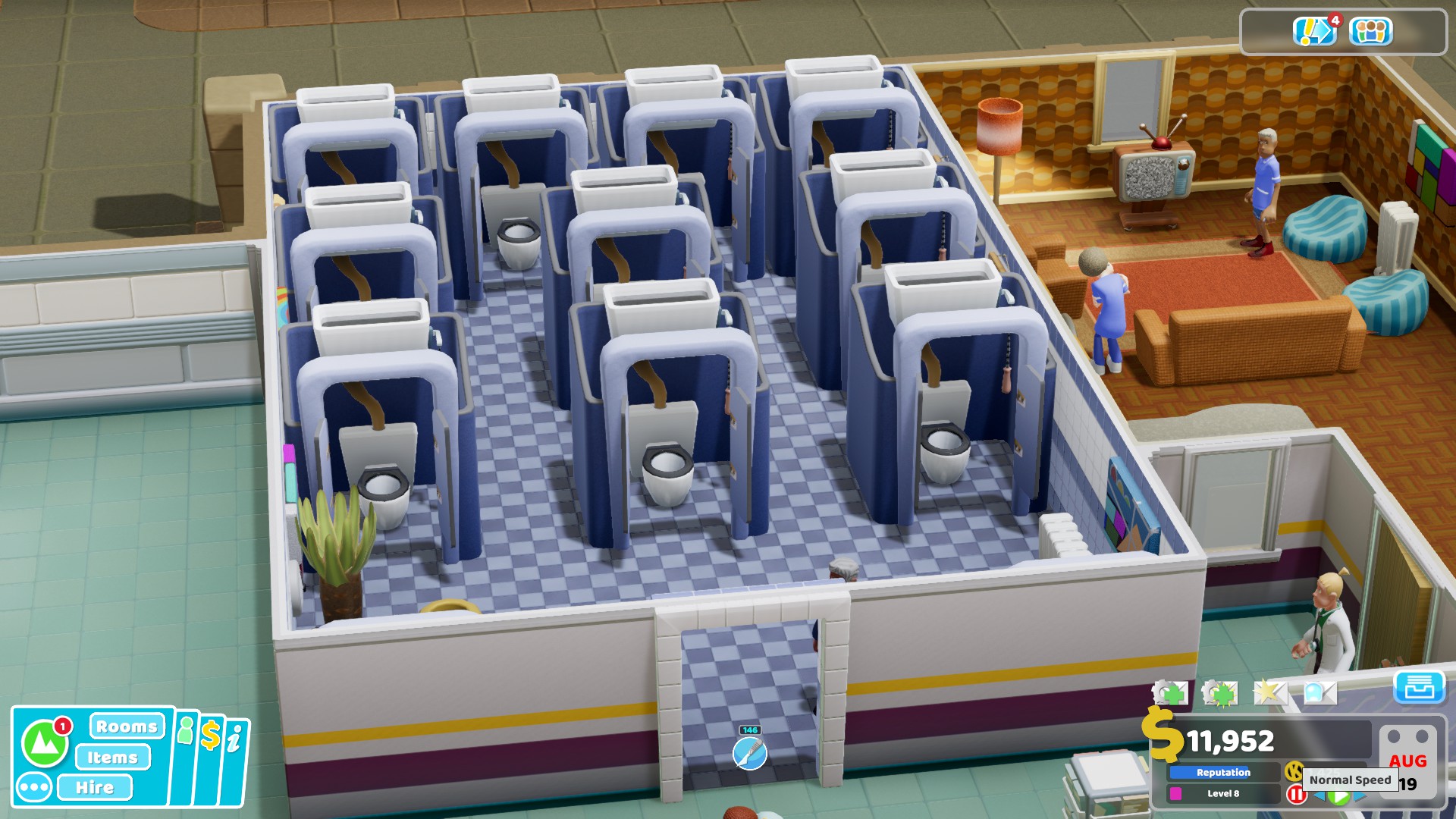
Hit those public targets
While you’re busy fighting with queues, training doctors and pinching pennies, you still be beholden to your government overlords. The public targets are arbitrary tasks like generating 200 research points or unclogging eight toilets, and as your only source of income, you’ll want to do them all as quickly as possible. The 50 grand you get for meeting your targets won’t last for very long, turning Two Point Hospital’s normally easy-going pace (despite all the disasters) into a frantic dash.
When you need to unclog toilets, fill vending machines, or some other kind of busy work to hit a goal, you don’t need to wait until they require maintenance. As long as they’ve not been filled up or unclogged recently, you should be able to order your janitors to get to work. With all the research goals, you’ll need a room for that, too. Keeping a research room running full-time shouldn’t be necessary, though. Since research is persistent, you can do it in earlier missions, letting you use Duckworth-upon-Bilge’s researcher as a surgeon, GP or some other role. Resist the temptation to do that with all of your staff, however. You don’t want your doctors and nurses running all over the hospital, jumping between jobs. Thankfully, you can control their assignments from the staff list.
Like the previous missions, everything from the hygiene levels of your hospital to the mood of your janitor still needs to be managed and juggled, and without cash there’s significantly less room for mistakes. The looming threat of bankruptcy means you’ll have to dig through the game’s menus and figure out how everything links together, creating a hospital that’s efficient, not just functional. It’s micromanagement intensive, but that’s when Two Point Hospital is at its very best, when it’s all about obsessing over nurse schedules and hand-crafting uber-doctors.

Fraser is the UK online editor and has actually met The Internet in person. With over a decade of experience, he's been around the block a few times, serving as a freelancer, news editor and prolific reviewer. Strategy games have been a 30-year-long obsession, from tiny RTSs to sprawling political sims, and he never turns down the chance to rave about Total War or Crusader Kings. He's also been known to set up shop in the latest MMO and likes to wind down with an endlessly deep, systemic RPG. These days, when he's not editing, he can usually be found writing features that are 1,000 words too long or talking about his dog.

